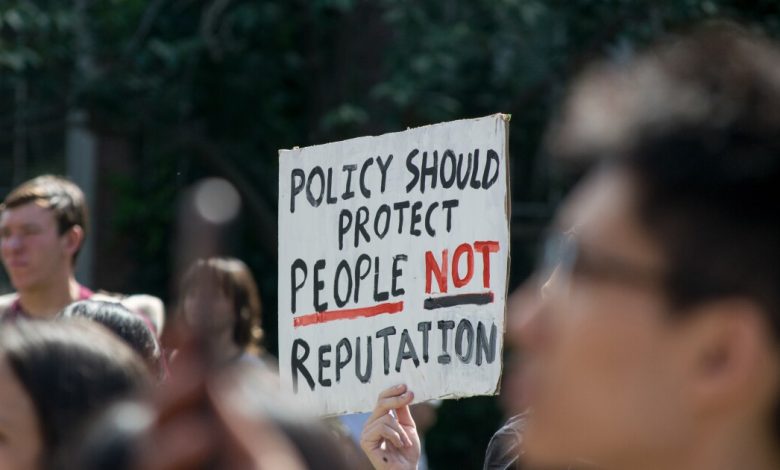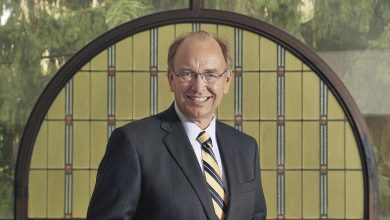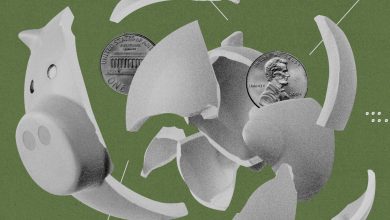2 Universities Tried to Stop ‘Passing the Harasser.’ Here’s What They’ve Learned.

[ad_1]
A few years ago, a campus lawyer at the University of California at Davis came to Binnie Singh with a question. A college at UC-Davis, where Singh is assistant vice provost, had selected a new hire. But some at the college had heard rumors about the candidate’s past conduct. What could they do?
Singh and the lawyer, Sheila O’Rourke, wanted to avoid perpetuating a common problem in academic hiring: “pass the harasser.” That happens when a professor or administrator who has been credibly accused of sexual misconduct on one campus leaves for another institution. The first campus — which might fear a defamation lawsuit, or might have signed a settlement agreement with the employee — stays quiet about the accusations, allowing the professor or administrator to continue harassing people at the new institution.
To avoid this series of events, Singh and O’Rourke asked the candidate to sign a release that allowed them to ask the person’s previous institution about the rumors. The candidate agreed, and the previous institution confirmed that there had been no documented history of disciplinary violations.
“We thought, Why don’t we do this as a regular thing?” Singh said in an interview on Thursday. She brought it up with other administrators across the University of California system and, eventually, with the UC-Davis faculty senate. Though there was skepticism, Singh said, faculty leaders didn’t raise major objections. So a pilot program began.
That was 2018. Today, UC-Davis officials say the policy — one of the first in higher education to tackle “pass the harasser” — has been a success. The university hasn’t been confronted with major legal problems because of the policy change, and officials believe it discourages harassers from applying altogether.
Not Automatically Disqualified
The university released a report this week on how the policy had worked so far and recommended that other colleges adopt something similar. The report is part of a yearslong effort by the National Academies of Sciences, Engineering, and Medicine to craft better procedures for preventing and responding to sexual harassment. Along with UC-Davis, the University of Wisconsin system also published a report on its work to stop “passing the harasser.”
The UC-Davis policy operates like this: Candidates applying for faculty positions with job security, such as tenure, sign a release saying that UC-Davis officials can contact their prior colleges for a reference check. Once a candidate is selected for a position and is approved by a dean, the university’s Office of Academic Affairs asks the candidate’s previous institutions about “substantiated findings from both ongoing and completed investigations regarding misconduct and associated discipline.” If those questions turn up findings of misconduct, the candidate is allowed to provide additional information. A panel of senior UC-Davis administrators will then meet to determine whether the information should disqualify the candidate.
Once a candidate has made it through that process, they are asked to sign another document attesting that they are not currently the subject of an active investigation.
The policy is designed to uncover other kinds of misconduct in addition to sexual harassment, such as discrimination. But a misconduct finding does not automatically mean the candidate is rejected. The UC-Davis panel considers how serious the misconduct was, how long ago it occurred, how many times it occurred, and whether the candidate took personal responsibility, the report said.
Of the more than 50 reference checks the university conducted, none turned up “any substantiated misconduct documented” at the candidate’s other institutions. University administrators suspect that requiring candidates to sign a release allowing UC-Davis to ask about past misconduct discouraged some would-be applicants from applying.
Importantly, none of the faculty members who have joined UC-Davis after going through this process have been accused of misconduct since they were hired.
‘Lack of Controversy’
The University of Wisconsin system’s new policy also directs administrators who are conducting reference checks to ask previous employers about sexual misconduct. That policy allows the system’s campuses to decide who will do the reference check and at what point in the process they will do it.
The Wisconsin policy also instructs people within the system on what to do when someone from another institution calls to do a reference check on a University of Wisconsin employee. The Wisconsin official directs the caller to an office where they can ask for information about the candidates’ disciplinary history, while stressing that it’s part of institutional policy and shouldn’t imply that the applicant committed harassment.
“What’s been notable about it,” Quinn Williams, the system’s general counsel, said, “is the lack of controversy.”
The system decided to create the policy in 2018, after reporting from the Milwaukee Journal Sentinel showed that employees who were accused of sexual misconduct at Wisconsin campuses had been able to quietly leave after being investigated and later were rehired at other colleges. In one case, a Title IX coordinator was accused of sexual misconduct and then went on to work at two other institutions.
The University of Wisconsin system did not yet know how many reference checks had turned up past misconduct so far, Quinn said. But as with UC-Davis, he suspected that the new policy was discouraging people who had a history of disciplinary violations from applying.
The biggest challenge has been pushing for transparency and information-sharing on a topic — sexual harassment — that’s legally fraught, the Wisconsin system’s report said. But the university “determined that greater legal liability would be incurred by not working to prevent passing harassers between institutions than by failing to do so because of concern about claims of defamation, retaliation, or discrimination by harassers.”
Neither UC-Davis nor the University of Wisconsin thought their new policies had substantially slowed the recruitment process. When asking about past misconduct, UC-Davis officials said it could be time consuming to connect with the right people at other institutions. Singh said a colleague suggested creating a shared document that listed those people at each University of California campus, and how to reach them.
“We’re just continuing to fine-tune things,” she said.
Many other universities have inquired about how to create similar policies, Williams said. He believes it’s a sign that the culture is changing — to one where more institutions feel comfortable sharing information that can stop harassers from quietly moving on to other victims.
[ad_2]
Source link






